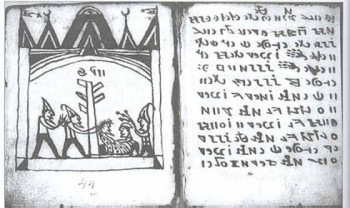History Between Text And Context, Read This
Jumat, 20 Januari 2023
History Between Text And Context, Read This
Text is a language expression which according to content, syntax, and pragmatics is a single unit (Luxemburg et al, 1989:86). From this understanding, it can be interpreted that text is a unit of language that has content and form, both spoken and written, which is conveyed by a sender to a recipient to convey a certain message.

Text is a language expression which according to content, syntax, and pragmatics is a single unit (Luxemburg et al, 1989:86). From this understanding, it can be interpreted that text is a unit of language that has content and form, both spoken and written, which is conveyed by a sender to a recipient to convey a certain message.
The term text actually comes from the word text which means 'woven'. Text in philology is defined as 'woven words', namely a series of words that interact to form a unified whole of meaning. Text can consist of several words, but it can also consist of billions of words written in a text containing a long story (Sudardi, 2001:4-5).
According to Bared (1985:56), text means the content or contents of a manuscript, something abstract can only be imagined. Text consists of content, namely the ideas or message that the author wants to convey to the reader. And forms, namely stories in text that can be read and studied according to various approaches through plot, character, style of language, and so on.
We must know that text is a product of human work. The text then explains how a dialectical process between humans and the world, or humans and other humans is carried out, historical records become streaks which then study how human needs can be "fulfilled" through a factor of production.

The text is a picture of science, the text is the past, and today's people come from humans who existed in the past. In the course of history text then becomes a means of producing a change. Just imagine that without the text of Das Kapital there might not be communism, without the Al-Qanun fi At Tibb maybe modern medicine would not exist, without the Origin of Species maybe today America would not be victorious, without the writings of Khaled Said maybe the Egyptian revolution would not have happened. Babylon is just a fairy tale in a book without the Code of Hammurabi. And remember that God even wrote down His words in the Book so that Man can interpret his life and transform the attributes of Divinity. Text is a motor of change, a means of social control, a moral driving force which is then almost similar to an intellectual function.
Herwono in his book entitled Binding Meaning states that text is a vitamin for humans, which with these vitamins can provide health for humans. Writing also in his view is a process of obtaining meaning in life. Writing & reading is a relationship that can not be separated. That is what later became great writers like Antonio Gramsci, Tan Malaka, Karl Marx, Pramoedya Ananta Toer, JK. Rowlings, etc. can then transform their search for meaning in life into written form for those who read. The writing then becomes information which then reforms the human mindset and even becomes a monumental social movement in society.
When text as content is inserted into the device of space and time of humans, actually there is an axiom attached to the nature of the text. Namely its ability to penetrate the barriers of space and time of humans. This text is a timeless narrative. That ability is neatly stored in the fact that it combines firmness and flexibility. He is firm on his basic truths, but flexible on his human processes.
The space of the living systems outlined in this text is the earth. While the time is human time since they inhabited the earth. So
history is the time. Earth is the stage. Man is the actor. This text is the scenario. From there a life story is assembled. That is why two-thirds of the contents of this text are stories of the lives of various people about how they live their lives. The rest are normative laws which if applied will give birth to a beautiful life story. Since most of the content of this text is history, the context becomes very important as an explanatory factor.
History is the writing of the journey of important human activities in a certain period. The writing is done based on written findings, facts in the form of relics, past work. Studying history should be learned from historical texts, not from history without text or history without principles. A nation that has lost historical texts cannot be separated from the condition of its citizens who are currently losing their conscience and common sense.
Historical events are the result of interactions between humans, space and time. If we put text into a structure where humans act in the context of space and time according to the flow of life stated in the text.

What is born from the interaction between humans, text, space and time we call text-based historical events. Because of this, many thinkers and philosophers of Muslim history are currently trying to read the expanse of Islamic historical phenomena by referring to that meaning. They say that not all historical events in the Muslim world can be called Islamic history. Islamic history by definition is a record of life events carried out by Muslim humans who are guided entirely by texts. For example, the life history of the era of the Prophet Muhammad SAW and the Rashidun Khulafa. Historical events that occurred without the guidance of the text cannot be recorded as Islamic history. Because it is a deviation from the text. On that basis they demand a rewriting of Islamic history so that it is framed in the correct meaning.
The history of the life of the Prophet SAW is the space and time in which this text is implemented. That way we get a living reference to understand the text through the life of the Prophet SAW. If the life of the Messenger of Allah we get validly through his narration or the narration of his friends about him, then now we get two texts. And the two texts mutually interpret each other. This is what the commentators mean by the method at tafsir bir riwayah (interpreting text by text). For example, the interpretation of Imam Ath-Tabari, Ibu Katsir and others.
Part of the life of Rasulullah SAW is a history of words. Part of it is a history of actions and attitudes. But the whole is a complete and complex life history. If these narrations are not strung together in a comprehensive construction, the result is a pockmarked face of life. For example, if we only raised the history of the Prophet Muhammad's wars, what would appear was a war commander whose entire life was only devoted to war. The other side of family and social and economic life may be lost. Then a defective understanding of the text is born, and then the implementation of the text is also lame.
But that's the big challenge. Because a comprehensive historical reconstruction is basically an intellectual and spiritual work which besides being based on accurate historical facts, it also relies on complex imagination abilities. This explains why Sayyd Qutb uses imagination as a tool in interpreting texts.
If friends who believe and live with Muhammad SAW interact with revelation directly with the recipient of the revelation, then their learning becomes much easier and perfect. Because they listen to texts, listen to explanations of texts, and more importantly than that, see living examples that apply the texts. There are rules and examples. There is theory and practice. There is an idea there is motion. There is news of an event. There is sound and appearance. Some are heard, some are seen. It's a gift that is their destiny. Our destiny may not be as good as theirs. We are now missing one aspect of the learning process and method, namely living examples alongside the text. But this shortcoming can be covered by the fact that all the motions and words of these living examples have come down to us through history and a very accurate transmission methodology that has never existed in the history of any civilization in the world. So accurate is the methodology of the transmission, that if it were applied, for example, to the history of the Greeks, we would not believe all the stories about Plato or Aristotle or Socrates as we now believe them.
Once upon a time in his childhood Muhammad Iqbal, the immortal poet from the Indian subcontinent, was reading the Quran. His father, who happened to see him, then ordered: “My son, read this Qur'an as it was revealed to Muhammad. Read it as if it was sent down just for you.”
Reference :Learning Series, Anis Matta, Tarbawi Magazine
Text, History and Change, Kompasiana
Image source from google
